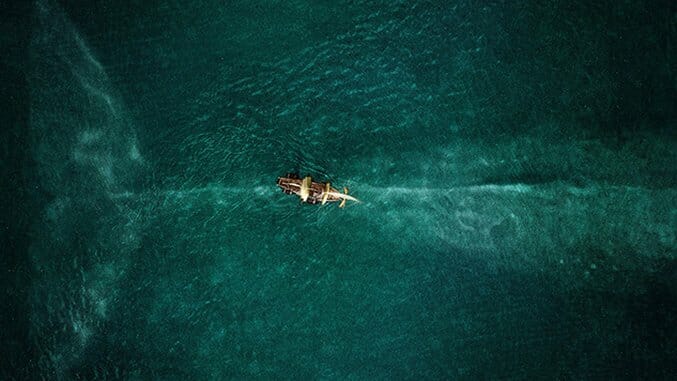In the Heart of the Sea

In the Heart of the Sea is a movie with an identity problem. It’s also a movie with an acting problem, a staging problem, a plot problem, a handful of FX problems and a narrative framework problem. Did Ron Howard learn nothing from Baz Luhrmann’s The Great Gatsby? Apparently, the takeaway from that film is that telling a story isn’t enough. We have to tell the story of the story that’s being told, too, which forces big screen literary adaptations to make a hideous choice. In this case: Would you rather see a movie about the true events that inspired Herman Melville to write Moby Dick, or a movie about Melville hearing of those events second hand from a sailor who experienced them first hand?
Howard tries to have his movie both ways. He presents In the Heart of the Sea as an honest account of what happened to the whaleship Essex while also buckling swashes on the open sea with Chris Hemsworth and a supporting cast of his iron-wrought pecs (plus Cillian Murphy, Benjamin Lawrence, Tom Holland and Benjamin Walker). But the film runs into trouble as soon as it begins by couching adventure in the grim reality of survivor’s guilt. We open with Melville (Ben Whishaw) arriving in Nantucket to speak with Thomas Nickerson (Brendan Gleeson), a surviving member of the fallen Essex willing to provide his version of the ship’s fate. Apparently, Melville thinks Nickerson’s tale could make a great book, much in the same way that Howard thinks a de-glamorized Moby Dick could make a great movie.
So Melville pays Nickerson a handsome sum for the man to regale the author with the sinking of the Essex, and the film immediately flashes back several decades to the 1820s, where we meet veteran whaler Owen Chase (Hemsworth) as he prepares to set sail on a two year journey for whale oil. Hemsworth might be the best worst person for the role: Chase has the kind of big, macho swagger that Hemsworth embodies in literally everything he does, and as an added plus, he carries a major chip on his shoulder. Though promised by his employers that he would captain his own ship on his next voyage, he’s forced to take a backseat to George Pollard, Jr. (Benjamin Walker), the son of a whaling dynasty whose name is worth more to the industry than Chase’s experience. You think that In the Heart of the Sea will revolve around them butting heads, Pollard the entitled and undeserving master of his charge, Chase the scrappy landsman who secured his position through good old fashioned hard work.
For one scene, it does: As the Essex leaves port, Pollard steers his men into a storm to test their mettle. For every order Pollard gives, Chase either issues a different order or simply ignores whatever Pollard says. Clearly, you might think, this is going to be a movie about male pride and dominance, and that will be the metaphorical foil to their eventual contest with Moby Dick himself. But no sooner does the script (by Warner Bros. staff writer Charles Leavitt) introduce this theme than it abandons it entirely and becomes a story of the younger Nickerson’s (Holland) coming-of-age under Chase’s gruff but brotherly tutelage. Hold on, though, because before too long after that, the crew is fighting for their lives against an enraged and oversized bull sperm whale, and In the Heart of the Sea becomes a “man versus nature” yarn.
-

-

-

-

-

-

-

-

-

-

-

-

-

-

-

-

-

-

-

-

-

-

-

-

-

-

-

-

-

-

-

-

-

-

-

-

-

-

-

-








































